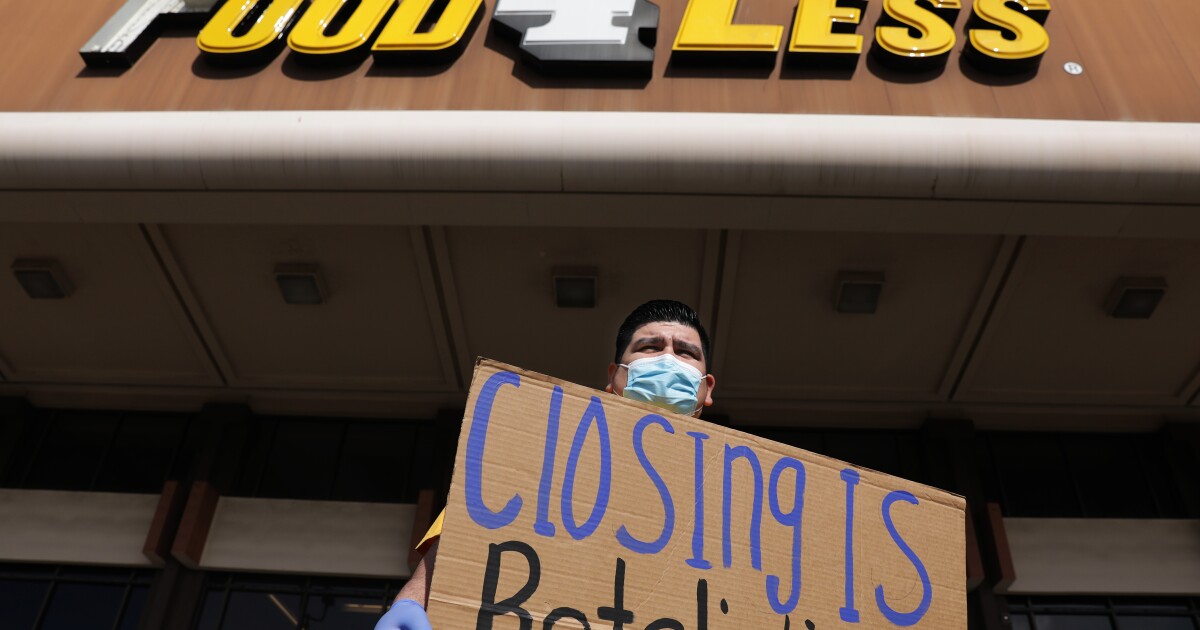
Grocery store workers have always been essential workers, but the pandemic transformed these jobs into hazardous work. Many of us have been able to quarantine at home while COVID-19 cases spiked and intensive care units ran out of room. But grocery store employees must wake up each day and muster the courage to go to work — and face a heightened risk of getting infected with COVID-19.
They are our neighbors, and they are our heroes. Hardworking people who put their health and lives in danger — and the lives of their families — to keep yours fed during the global pandemic.
That’s why the city of Long Beach passed an ordinance in January that requires major grocery and retail stores to provide temporary “hero pay” to their workers. The ordinance took effect late January, which means these workers, the majority of whom are low-income women of color, will receive an additional $4 per hour through late May. This will help provide a safety net as they continue to face greater risk at work while the pandemic continues.
The need for hero pay is undeniable, and the data proves it: A Harvard University study found that one in five grocery workers tested positive for COVID-19 — and workers who interact with customers are five times as likely to test positive.
That level of exposure often leads to hospitalization and even death. Workers who need to quarantine are rapidly exhausting paid sick leave, forcing them to pay for this work-related necessity out of their own pockets. These are steep costs that many grocery workers, who often live paycheck to paycheck, can’t afford on hourly wages that don’t take into account the added cost of these new health risks.
An extra $4 per hour for the average worker, who puts in roughly 30 hours a week, amounts to about $2,000 in extra income over the 17-week period covered by the ordinance. It’s a paltry sum for corporations that run supermarkets and saw their profits double in the last year due to increased sales during the pandemic.
Long Beach’s hero pay ordinance was the first of its kind in the country aimed specifically at frontline essential grocery and food retail workers. Since then, Santa Monica, Los Angeles, San Jose, Oakland and, just this week, Berkeley, have joined the movement, along with other cities across the nation.
Last month, Trader Joe’s announced it would double its “thank you” pay, to $4 an hour, for its workers during the pandemic. It’s clear grocery companies are capable of providing hero pay — if they want to.
Instead of protecting the frontline employees who keep their stores running, Kroger Co., the grocery giant behind Ralphs and Food 4 Less, has decided to strike back. The company is shuttering two stores in Long Beach and, in turn, creating food deserts in the city’s poorest neighborhood.
And Kroger is sending a message to essential workers that, despite its slogan, we never really were “all in this together.”
To make matters worse, diverse communities like Long Beach are being disproportionately affected by COVID-19.
At the beginning of the pandemic, Kroger voluntarily gave workers one-time hazard pay bonuses of $300 for full-time workers and $150 for part-time employees. That’s a small amount in the scheme of things, especially as the pandemic has dragged on. Since giving out those one-time bonuses, the company reported operating profits of $2.9 billion through the third quarter of 2020, taking in $1.2 billion more in earnings compared to the year before.
Still, the bonus was Kroger’s version of hero pay. Rodney McMullen, the company’s chief executive, declared, “The true heroes in this story are our associates, and we want to provide them with the additional resources and support to help them continue their remarkable effort.”
Stirring words, but the relief those bonuses provided is now long gone, while the heightened risk of getting sick with COVID while working at a grocery store remains.
Instead of putting workers and communities at risk, corporate grocers like Kroger should use their economic power to prove that profits and worker safety are not mutually exclusive. Making it safely through this pandemic requires every one of us to do the right thing by coming together, supporting one another and, above all, protecting those at risk. We urge Kroger Co. to find their courage and join us.
Robert Garcia is mayor of Long Beach. Anthony Rendon (D-Lakewood) is speaker of the state Assembly.
"pay" - Google News
February 27, 2021 at 06:00PM
https://ift.tt/3bFeSia
Op-Ed: Kroger shouldn't close stores to avoid pandemic 'hero pay' - Los Angeles Times
"pay" - Google News
https://ift.tt/301s6zB
Bagikan Berita Ini














0 Response to "Op-Ed: Kroger shouldn't close stores to avoid pandemic 'hero pay' - Los Angeles Times"
Post a Comment